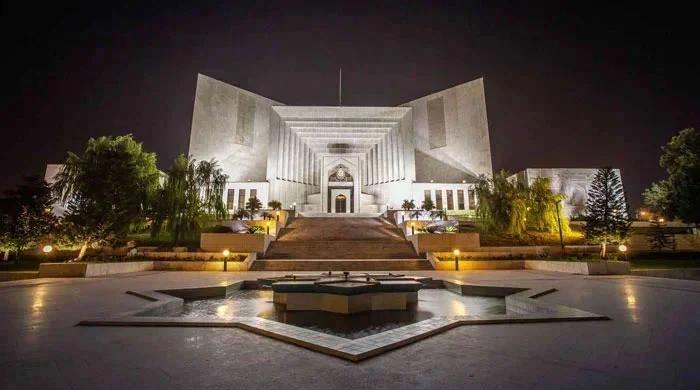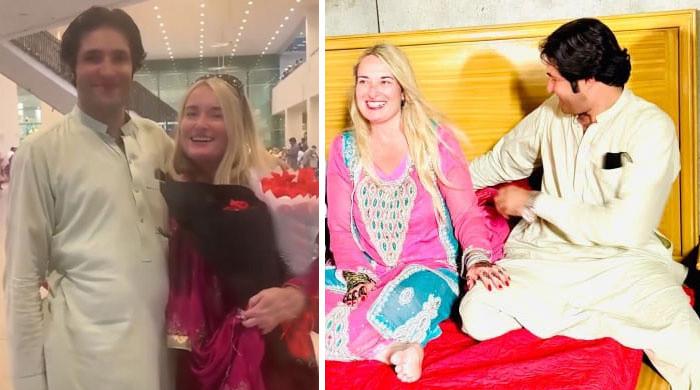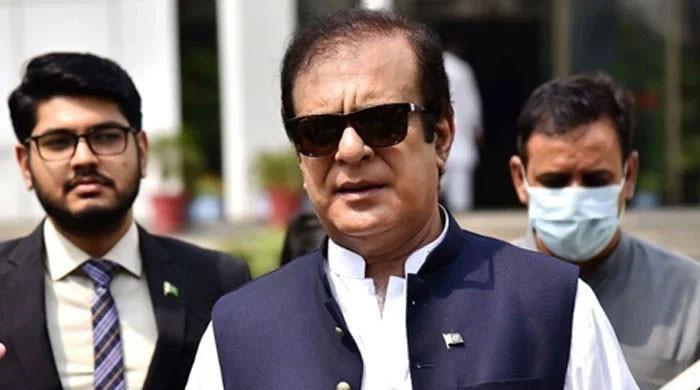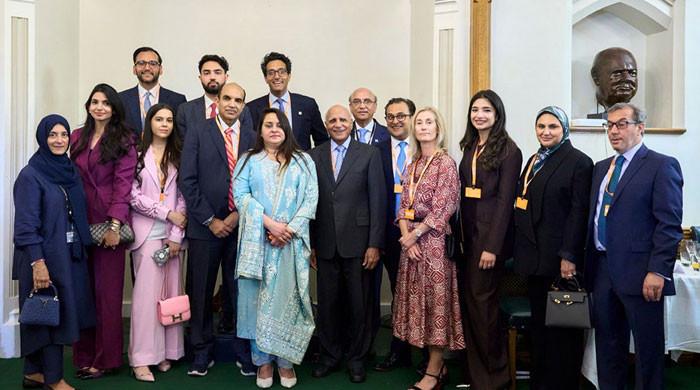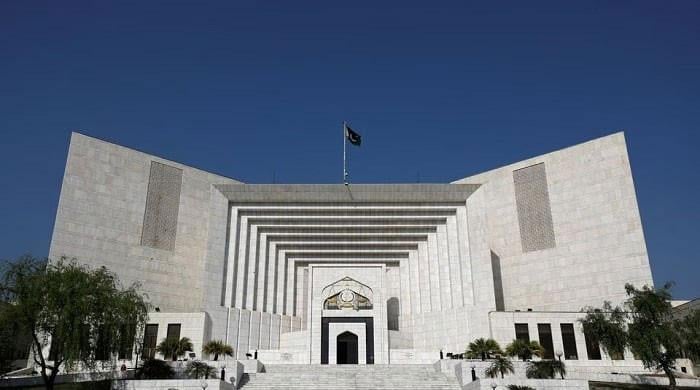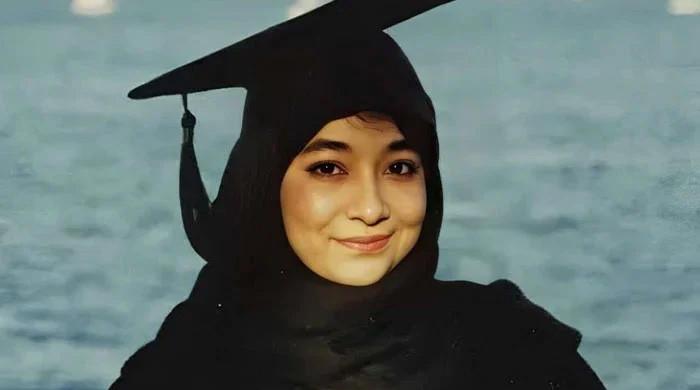Peshawar's Qissa Khwani bazaar keeps historic tradition of storytelling alive
People revel in centuries-old tradition of storytelling as they enjoy Qehwa and Chappli kebab at historic bazaar
April 09, 2023
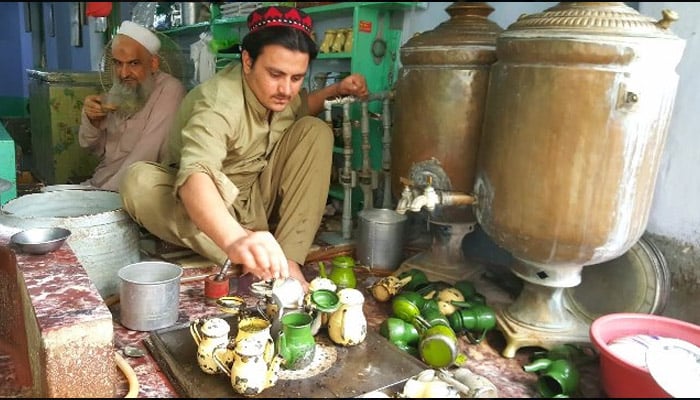
PESHAWAR: The centuries-old tradition of storytelling and traditional Peshawari Qehwa (green tea), along with chappli kebab continued from Iftar to Sehri during Ramadan at the historic Qissa Khwani bazaar.
One of the oldest bazaars of South Asia, Qissa Khwani is full of food shops, hotels, and Qehwa Khanas that attract a large number of visitors, who enjoy the mouthwatering chappli kabab, paye, mutton karahi, fried fish, kabuli pilau and other traditional dishes at Iftar parties.
“I came along with my family to my favourite Qissa Khwani to enjoy its delicious chappli kebab and paye with its famous Qehwa at Iftar arranged by my father for family members here on Sunday,” Fahim Khan of Nowshera district said.
The mouthwatering fried fish, chicken roast and kulfi-falooda along with the famous qehwa were adding colours to the Iftar parties, he added. “It was my second Iftar of the current Ramadan here and I will come again on the 29th fast of Ramadan for a grand Iftar party with my friends and relatives.”
“People come here in groups and with families for Iftar parties to enjoy the delicious traditional cuisines,” shared Fazl Rehman, owner of the famous Mohmand Qehwa at Shah Wali Qatal Street at Qissa Khwani.
However, the wide variety of mouthwatering food is not the only thing that attracts throngs of people to the bazaar.
Another enthralling feature of the market is its rich tradition of storytelling — arguably accounting for its name.
According to Rehman, people revel in the centuries-old tradition of storytelling as they enjoy his famous Qehwa at the historic bazaar.
Sipping lazily on their cups of hot Qehwa, people who sit at the bazaar till sehri swap tales of ancient culture, music, art, politics and traditional norms.
Historically, the Qissa Khwani Bazaar — located in the heart of Peshawar City near historical Chowk Yadgar, Ghanta Ghar and Balahisar Fort — was a key trade and cultural centre where merchants from the subcontinent, Afghanistan and Central Asia stayed at night and shared tales of love, culture, art and architecture, music and traditions, before their departure to their respective destinations.
The bazaar starts from Kabuli Gate takes only eight to 10 minutes to reach after disembarking from the BRT station of Khyber Bazaar and takes visitors to the primordial age as they witness its centuries-old architectural buildings, artisans’ shops, restaurants and Qehwa Khanas.
During its peak period, the bazaar served as a campground for trade caravans of merchants from Delhi, Amritsar, Lahore, Kabul, Dushanbe, Ashgabat and Tashkent, who used to enter the city’s gates to unload their merchandise.
The bazaar has witnessed the vigour of great warriors, invaders and kings including Alexander the Great, Mehmood Ghaznvi, Zaheeruddin Babar, Nadir Shah, Ahmed Shah Durrani and his grandson Shah Zaman who marched through the famous Khyber Pass during their invasions of India.
“Making Qehwa is my passion which I inherited from my father in 1970 and my son has also joined us during Ramadan,” Rehman said proudly.
He said the majority of his customers ask for Qahwa. However, Qahwa with milk — locally Known as Sheen Da Payo — was a special iftar item at Qisakhwani.
Following the creation of Pakistan, he said, the tea stalls of the bazaar became centres of political discussion where locals exchanged views about the country’s political situation.
He recounted the elections between Fatima Jinnah and Gen Ayub Khan, 1965 Pak-India War, OIC Lahore Summit 1974, and a number of sports and cultural events including the 1992 cricket world cup as some of the most hotly discussed topics at the bazaars many tea shops and stalls.
“Qissa Khwani’s history is believed to be as old as the history of Peshawar,” said Bakht Zada Khan, Research Officer Museums and Archeology Department while talking to APP.
“The recent archaeology excavation at ancient Gor Khatri had established the city’s historical profile declaring Peshawar as ‘Oldest Living City’ in South Asia with a primitive history going back to about 539 BC.”
He said the Gor Khatri excavation was the deepest and biggest in the world which revealed that the 20 layers of soil provide a complete profile of this ancient city ranging from British to pre-Indo-Greek era.
Thus, the unique tradition of storytelling and drinking of Qehwa became an integral part of Qissa Khwani culture, which is still continuing despite the passage of centuries.
Foreign and domestic tourists can also take glimpses of the ancestral houses of Bollywood superstars including Yousaf Khan alias Dalip Kumar at Mohallah Khudadad, Haveli of Raj Kapoor’s father Prithvi Raj and residence of Shah Rukh Khan’s family at Shah Wali Qatal at Qissa Khwani.
“Peshawar’s Qissa Khwani and Dilip Kumar sahib are inseparable,” Faud Ishaq, former President Sarhad Chamber of Commerce and Industry (SCCI) and nephew of the Peshawar-born India’s cinema legend Dilip Kumar said.
He added Dilip Kumar’s love for Peshawar could be judged by his will in which he wished to use his ancestral house for the welfare of Peshawarities.
The Haveli of Raj Kapoor’s father Prithvi Raj, who moved to Mumbai in 1930 where he prevailed over the South Asian film industry both as an actor and producer — laying the first Bollywood dynasty spanned about four generations — also serves as a major attraction for visitors at Dhaki Nalbandi near Qissa Khwani.
The house of Taj Muhammad Khan, father of Bollywood legend Shah Rukh Khan was located at Shah Wali Katal Qissa Khawani where his celebrated son had a good time with his family members.
Moreover, the arched white marble monument erected in the middle of the bazaar to honour all those martyred in the Qissa Khwani massacre by British troops in 1930, also remained the centre of attraction for many.
British Commissioner of Peshawar, Herbert Edwards had a great love for Qissa Khwani who called it the ‘Piccadilly of South Asia’. During colonial rule, Britishers used informers to know public opinion over administrative decisions by instructing them to visit city areas and bring `Qissa Khawani Gazzattee’.
“I have been selling Chappli Kebab for the last 25 years at Qissa Khwani that attracts substantial buyers by taking its parcel to their families at home for Iftar parties and many prefer to enjoy here at hotels during Iftar dinner,” said Ismail Ali.
He said that Qissakhwani had witnessed a sharp decrease in the arrival of tourists during 2001-13 when terrorists targeted this cultural hub of Peshawar that claimed so many precious lives including Senior Minister Bashir Ahmed Bilour in 2012 and CCPO Malik Muhammad Saad Shaheed in 2007.
He said the terror attacks and the Covid-19 lockdowns had an adverse effect on the Qehwa and Chappli Kabab businesses here.
“In spite of economic losses, we continued our business even in those days when people were afraid to visit this ancient market,” he said.
He said an increase in tourist arrival has been witnessed at Qissakhwani with the overwhelming response of domestic travellers from Punjab, Swat, Chitral, Nowshera, and Dir Upper this year.
“I came from Karak to enjoy Chappli Kabab along with traditional Qehwa at Qisa Khwani bazaar at iftar,” said Waris Khan, an employee of the federal government.
“My visit to Peshawar remains incomplete without visiting this historic street,” he said.
“This place is the identity of Peshawar and solid efforts are required to preserve its cultural heritage, architecture, artwork, and substantial revenue could be generated by maintaining its beauty and primitive heritage,” said Shaukat Ali Khan, Chairman Central Organization for Traders Khyber Pakhtunkhwa (KP).
He said about Rs50,000 per 50kg are being spent on the import of green tea — most of which comes from Vietnam.
He further shared that this amount could be saved by facilitating investors and farmers to cultivate green tea in upper KP, especially in Malakand and Hazara divisions.
He urged the government to give special financial incentives to investors for the purchase of machinery for tea cultivation, harvesting, and the maintenance of Qissakhwani.
The Khyber Pakhtunkhwa government completed the ‘Cultural Heritage Trail” project in 2018 in Peshawar under which 500 meters long trail from ancient Ghanta Ghar to Gor Khatri and the outlook of 85 heritage buildings including the famous Sethi House at Mohalla Sethian were renovated and preserved.
Starting at historical Ghanta Ghar, the trail passes through ancient Mohallah Sethian with a number of beautiful houses constructed by the Sethi family back in the 1880s that were preserved.
A proposal is under consideration for the face uplift of Qissakhawani to restore its centuries-old outlook for apprising new generations about the historical past of the bazaar when it remained the hub of commerce between the subcontinent and Central Asia.




